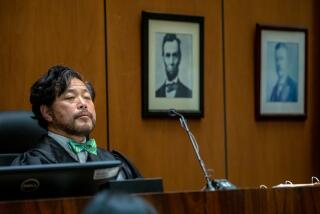Lawyers Spar Over Citron Evidence : Courts: Judge tells prosecutors grand jury bankruptcy probe is ‘the public’s business’ and should be available for ex-treasurer’s leniency plea.
- Share via
SANTA ANA — Lawyers wrangled in court Tuesday over what investigative materials prosecutors must give former Orange County Treasurer-Tax Collector Robert L. Citron to aid his bid for leniency at sentencing next month.
Orange County Superior Court Judge David O. Carter said Citron was entitled to “relevant” evidence culled by investigators probing the roots of the county’s bankruptcy, but he put off ruling until Thursday whether to order prosecutors to release any evidence.
Carter told the lawyers in a subsequent session to begin planning how to share some undisputed evidence--grand jury testimony and taped statements relating to the prosecution of Citron’s onetime deputy, former Assistant Treasurer Matthew Raabe.
Carter reiterated his frustration over delays in the Citron case and warned prosecutors he was “not impressed” with their claims that disclosing evidence favorable to the longtime treasurer would endanger a secret probe by the Orange County Grand Jury and might violate the privacy of some who have come under scrutiny.
“The public’s business will now be the public’s business,” Carter declared near the end of a 90-minute hearing. “This is not an individual that you’re protecting [from an invasion of privacy]. This involves an entire county government.”
Carter said he would summon grand jury foreman Mario Lazo to Citron’s Dec. 29 sentencing to testify about the pace of the probe.
Citron’s attorney, David W. Wiechert, is seeking a wide array of materials supporting his contention that an ailing and otherwise law-abiding Citron deserves probation instead of prison time because he was manipulated by county officials and securities dealers into the illegal financial actions to which he pleaded guilty.
Prosecutors oppose turning over what could be a mountain of evidence, arguing it could undermine the continuing investigation.
“We’re in an unusual situation here,” Deputy Dist. Atty. Matthew Anderson said. He said prosecutors are still not ready to suggest a punishment for Citron.
Wiechert said he needs evidence gathered by prosecutors to prepare his case for sentencing.
“I only have what Mr. Citron knows,” Wiechert said. “I don’t have what was going on behind Mr. Citron’s back while he was the treasurer, especially for the 1993 and 1994 time period.”
It was during that time, Wiechert said, that Citron began suffering “psychological maladies” and Raabe played a key role in managing the ill-fated investment pool for the county and 200 other government agencies. Citron’s failed strategies resulted in $1.7 billion in losses, prompting the largest municipal bankruptcy in U.S. history.
Citron has blamed Raabe for diverting $80 million in interest due other pool participants into a reserve account and later into the county’s general fund. The diversion was so large, Wiechert argued Tuesday, that others in county government had to know.
Raabe, the only other person charged in the investment scandal, is awaiting trial on the same felony charges--including misappropriation of public funds and falsifying documents--to which Citron pleaded guilty. Prosecutors have said they can share evidence in the completed Raabe investigation, which produced more than 34,000 pages, hundreds of cassette tapes and dozens of computer disks. But some of that could take weeks to prepare, Anderson said.
Wiechert also said he was interested in the roles played by the Wall Street firm of Merrill Lynch & Co., its bond salesman Michael Stamenson and an outside law firm that signed off on the county’s investments, as well as county lawyers and auditors he said should have known of the diversions.
“Other people were more responsible or equally responsible with Mr. Citron,” Wiechert said.
Carter questioned whether much of the material sought by Citron would matter in sentencing. “It sounds in a way that we’re going back through what could have been a trial,” he said.
More to Read
Sign up for Essential California
The most important California stories and recommendations in your inbox every morning.
You may occasionally receive promotional content from the Los Angeles Times.












